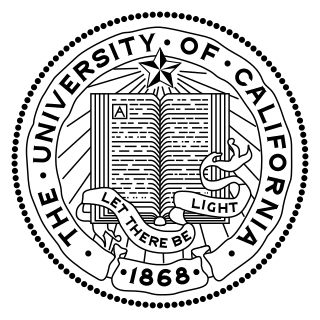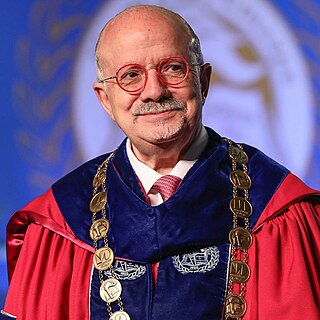Related Research Articles

The University of California (UC) is a public land-grant research university system in the U.S. state of California. Headquartered in Oakland, the system is composed of its ten campuses at Berkeley, Davis, Irvine, Los Angeles, Merced, Riverside, San Diego, San Francisco, Santa Barbara, and Santa Cruz, along with numerous research centers and academic centers abroad. The system is the state's land-grant university.

The University of California, Berkeley is a public land-grant research university in Berkeley, California, United States. Founded in 1868 and named after the Anglo-Irish philosopher George Berkeley, it is the state's first land-grant university and is the founding campus of the University of California system.

The California State University is a public university system in California, and the largest public university system in the United States. It consists of 23 campuses and seven off-campus centers, which together enroll 457,992 students and employ 56,256 faculty and staff members. In California, it is one of the three public higher education systems, along with the University of California and the California Community Colleges systems. The CSU system is officially incorporated as The Trustees of the California State University, and is headquartered in Long Beach, California.

Clark Kerr was an American economist and academic administrator. He was the first chancellor of the University of California, Berkeley, and twelfth president of the University of California.

John Leroy Hennessy is an American computer scientist who is chairman of Alphabet Inc. (Google). Hennessy is one of the founders of MIPS Technologies and Atheros, and also the tenth President of Stanford University. Hennessy announced that he would step down in the summer of 2016. He was succeeded as president by Marc Tessier-Lavigne. Marc Andreessen called him "the godfather of Silicon Valley."

John Michael Bishop is an American immunologist and microbiologist who shared the 1989 Nobel Prize in Physiology or Medicine with Harold E. Varmus. He serves as an active faculty member at the University of California, San Francisco (UCSF), where he also served as chancellor from 1998 to 2009.

Carol Tecla Christ is an American former academic administrator. She served as the 11th Chancellor of the University of California, Berkeley, from 2017 to 2024.

Harold Tafler Shapiro is an economist and university administrator. He is currently a professor of economics and public affairs at the Princeton School of Public and International Affairs at Princeton University. Shapiro served as the president of University of Michigan from 1980 to 1988 and as the president of Princeton University from 1988 to 2001.

The University of California, Berkeley School of Education, or the Berkeley School of Education (BSE), is one of fifteen schools and colleges at the University of California, Berkeley, a public research university in Berkeley, California. The BSE specializes in teacher training and education research.
The California Master Plan for Higher Education of 1960 was developed by a survey team appointed by the Regents of the University of California and the California State Board of Education during the administration of Governor Pat Brown. UC President Clark Kerr was a key figure in its development. The Plan set up a coherent system for public postsecondary education which defined specific roles for the already-existing University of California (UC), the state colleges which were joined together by the Plan into the State College System of California and later renamed the California State University (CSU), and the junior colleges which were later organized in 1967 into the California Community Colleges (CCC) system.

The Order of the Golden Bear is an honor society at the University of California, Berkeley composed of students, faculty, and alumni committed to serving the University of California.

Eduardo José Padrón is President Emeritus of Miami Dade College (MDC). An economist by training, Padrón earned his Ph.D. from the University of Florida. After serving as a faculty member at MDC, he became the school's president in 1995. Time named him one of the ten best college presidents in 2009, and he was awarded the Presidential Medal of Freedom in 2016.

Barry Allen Munitz has been a senior administrator at the University of Illinois and the University of Houston, a business executive at Maxxam, Inc., chancellor of the California State University system, and chief executive officer of the world's wealthiest art institution, the J. Paul Getty Trust. He is on the Board of Selectors of Jefferson Awards for Public Service.
The history of the University of California, Berkeley, begins on October 13, 1849, with the adoption of the Constitution of California, which provided for the creation of a public university. On Charter Day, March 23, 1868, the signing of the Organic Act established the University of California, with the new institution inheriting the land and facilities of the private College of California and the federal funding eligibility of a public agricultural, mining, and mechanical arts college.

Timothy Peter White is a retired academic administrator and kinesiologist. He served as the chancellor of the California State University system from December 2012 to December 2020. He was the chancellor of the Riverside campus of the University of California from 2008 to 2012.
Andrew Furco is an American scholar, researcher, and educator in the field of experiential education, whose work has focused primarily on advancing research in service learning. Service learning is an instructional approach whereby students participate in community service that is linked to their academic learning. Service learning has been adopted in K–12 schools, colleges, and universities in the United States, Canada and in countries throughout South America, Australia, Africa, Asia and Europe.

Diana Natalicio was an American academic administrator who served as 10th president of the University of Texas at El Paso (UTEP) from 1988 to 2019. After growing up in St. Louis, Natalicio studied Spanish as an undergraduate, completed a master's degree in Portuguese and earned a doctorate in linguistics. She became an assistant professor at UTEP in 1971, and was named the first female president of the university on February 11, 1988.
George W. Breslauer is an academic in the field of social sciences and the former executive vice chancellor and provost of UC Berkeley.
Constance M. Carroll is an American education leader and advisor. She served as the chancellor of the San Diego Community College District from 2004 to 2021.

Reginald DesRoches is an American civil engineer has served as the president of Rice University since July 1, 2022. From 2020 until 2022, he served as provost of Rice. Earlier, beginning in 2017, he was the dean of engineering at Rice's school of engineering, and from 2012 to 2017, DesRoches held the Karen and John Huff Chair at the Georgia Institute of Technology.
References
- 1 2 "History of the Clark Kerr Award" (PDF). Archived from the original (PDF) on August 19, 2016. Retrieved March 25, 2013.
- ↑ Hechinger, Grace (2003-12-02). "Clark Kerr, Leading Public Educator and Former Head of California's Universities, Dies at 92 (Published 2003)". The New York Times. ISSN 0362-4331 . Retrieved 2021-02-13.
- ↑ Johnson, Dean C. (1996). The University of California: History and Achievements. Regents of the University of California.
- ↑ "History of the Clark Kerr Award | Academic Senate". academic-senate.berkeley.edu. Retrieved 2021-02-13.
- 1 2 3 4 5 6 "Clark Kerr Award | Academic Senate". academic-senate.berkeley.edu. Retrieved 2023-08-16.
- 1 2 "2021 Clark Kerr Award | Academic Senate". academic-senate.berkeley.edu. Retrieved 2022-10-02.
- ↑ "Leading Black Educators in US Black Engineer Magazine". US Black Engineer. Retrieved 2021-02-13.
- ↑ "Marye Anne Fox to Receive the Clark Kerr Award for Distinguished Leadership in Higher Education". Women In Academia Report. 2014-02-20. Retrieved 2021-02-13.
- ↑ "UTSA President Ricardo Romo receives prestigious UC Berkeley leadership award". www.utsa.edu. Retrieved 2021-02-13.
- ↑ "About the President | Office of the President". president.columbia.edu. Retrieved 2021-02-13.
- ↑ "John Hope Franklin Given Top Honor By UC Berkeley's Academic Senate". today.duke.edu. Retrieved 2021-02-13.